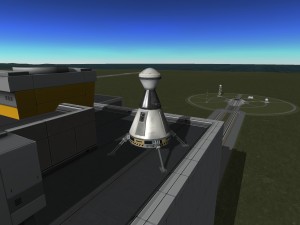And then I needed a rescue mission
During my ongoing literature review I often discover interesting facts about things I’ve never thought about. Sometimes I can connect these facts with my own observations: The result is mostly a completely new idea why things are as they are. Maybe these ideas are new to you, too. Therefore I’ll share my new science based knowledge with you!
This week: This time, I’ll discuss the attractiveness of open world games. Players of such games experience a personal and unique story. Every moment is different and players can behave as they like without any constraints.
I’ve already discussed a lot the topic of real emotions evoked by virtual environments[1][2]. Most emotional experiences are coming from the story the players are experiencing during their journey through the game. Typically, the story is predetermined and every player will experience the same story arch. Some games, like the Mass Effect[3] series, do have a non lineary story, allowing the players to experience different endings based on their decisions during their playthrough. This allows the players to experience different things in the same game so that every playthrough seems to be unique. However, even the different endings are predetermined to a certain degree. At some point, the story will be the same, if players have done the same decisions.
In contrast to these story based games, sandbox games like Kerbal Space Program (KSP)[4] or open world survival games like DayZ[5] don’t have any predetermined story. The players are left alone with a gigantic world they can explore and use to create their own unique story. Experiencing an unique story can be very intense for the player, because it’s a spontaneous development no one has expected.
Without a clearly defined goal, but with almost endless possibilities of interacting with the world, players start to explore the environment on their own and automatically write their own story in this process. Obviously, key situations like running out of gas in the middle of ghost town full of deadly zombies in DayZ or stranding on the Mün in KSP happens to almost every player. However, the reasons for these situations are in most cases different and the actions the players take to solve the situations are different, too.
This openess allows every player to experience an unique situation every time they play the game. Players are even more proud of their achievements or results. The broad variety of different approaches and different outcomes distinguishes every achievement from each other. Players can tell their stories to other players who will listen with a great interest[6]. Players are aware of the boundaries of the virtual environment and have made their own experiences. These experiences allow each player to understand the stories and to appreciate the achievements of others. Additionally, players don’t know in advance how the story will end, becauso nothing is predetermined. (Well, based on my own observations, some rocket designs in KSP are predetermined to crash …) Hearing from the experiences of other can also evoke new ideas that need to be tried out in that particular game–a new story begins.
To wrap things up, surprise is another great emotion caused by computer games, that keeps gamers playing. Open world games have always the potential of surprising their players with different outcomes. The different results finally lead to different stories the players are experiencing. Hearing the story of others can evoke own ideas of new personal in-game goals.
In the end, open world games without a story might be more colorful than games with a predetermined story. The success of these open world games might be caused by this special feature of allowing players to experience their own stories.
